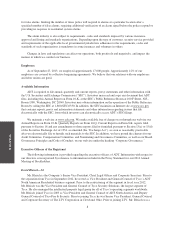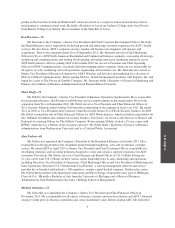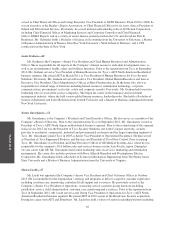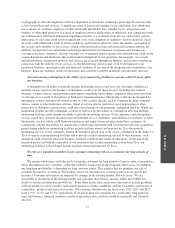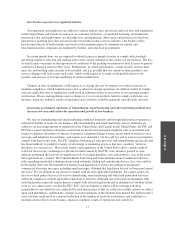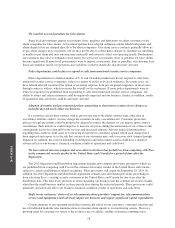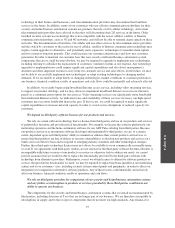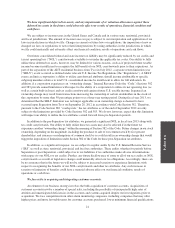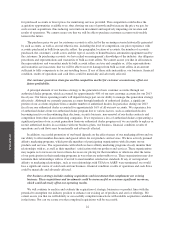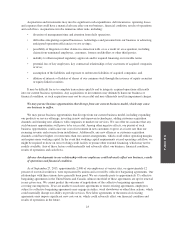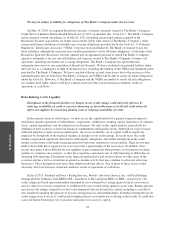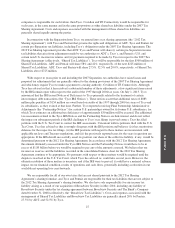ADT 2013 Annual Report Download - page 82
Download and view the complete annual report
Please find page 82 of the 2013 ADT annual report below. You can navigate through the pages in the report by either clicking on the pages listed below, or by using the keyword search tool below to find specific information within the annual report.
FORM 10-K
We could be assessed penalties for false alarms.
Some local governments impose assessments, fines, penalties and limitations on either customers or the
alarm companies for false alarms. A few municipalities have adopted ordinances under which both permit and
alarm dispatch fees are charged directly to the alarm companies. Our alarm service contracts generally allow us
to pass these charges on to customers, but we may not be able to collect these charges if customers are unwilling
or unable to pay them and such outcome may materially and adversely affect our operating results. Furthermore,
our customers may elect to terminate or not renew our services if assessments, fines or penalties for false alarms
become significant. If more local governments were to impose assessments, fines or penalties, our customer base,
financial condition, results of operations and cash flows could be materially and adversely affected.
Police departments could refuse to respond to calls from monitored security service companies.
Police departments in a limited number of U.S. and Canadian jurisdictions do not respond to calls from
monitored security service companies, either as a matter of policy or by local ordinance. In certain cases, we
have offered affected customers the option of receiving response from private guard companies, in most cases
through contracts with us, which increases the overall cost to customers. If more police departments were to
refuse to respond or be prohibited from responding to calls from monitored security service companies, our
ability to attract and retain customers could be negatively impacted and our business, financial condition, results
of operations and cash flows could be adversely affected.
Adoption of statutes and governmental policies purporting to characterize certain of our charges as
unlawful may adversely affect our business.
If a customer cancels their contract with us prior to the end of the initial contract term, other than in
accordance with the contract, we may charge the customer an early cancellation fee. Consumer protection
policies or legal precedents could be proposed or adopted to restrict the charges we can impose upon contract
cancellation. Such initiatives could compel us to increase our prices during the initial term of our contracts and
consequently lead to less demand for our services and increased attrition. Adverse judicial determinations
regarding these matters could cause us to incur legal exposure to customers against whom such charges have
been imposed and expose us to the risk that certain of our customers may seek to recover such charges through
litigation. In addition, the costs of defending such litigation and enforcement actions could have a material
adverse effect on our business, financial condition, results of operations and cash flows.
We have entered into non-compete and non-solicit restrictions that prohibit us from competing with Tyco
in the commercial security market in the United States and Canada for a period of time after the
Separation.
The 2012 Separation and Distribution Agreement includes non-compete provisions pursuant to which we
are prohibited from competing with Tyco in the commercial security market in the United States and Canada,
subject to certain small business related exceptions. These provisions will expire on September 29, 2014. In
addition, the 2012 Separation and Distribution Agreement contains non-solicitation provisions preventing us
from soliciting Tyco’s existing security customers in the United States and Canada for two years after the
distribution date. This effectively prevents us from expanding our business into the commercial security market,
other than the small business market, in these jurisdictions during the restricted periods. These provisions could
materially and adversely affect our business, financial condition, results of operations and cash flows.
Shifts in our customers’ choice of, or telecommunications providers’ support for, telecommunications
services and equipment could adversely impact our business and require significant capital expenditures.
Certain elements of our operating model have historically relied on our customers’ continued selection and
use of traditional land-line telecommunications to transmit alarm signals to our monitoring centers. There is a
growing trend for customers to switch to the exclusive use of cellular, satellite or Internet communication
18


